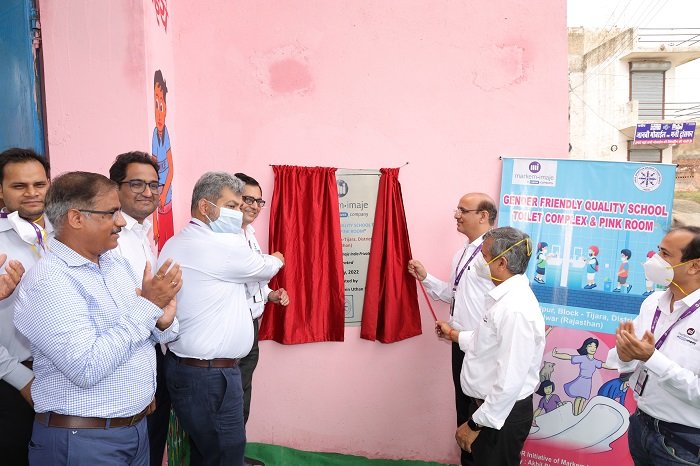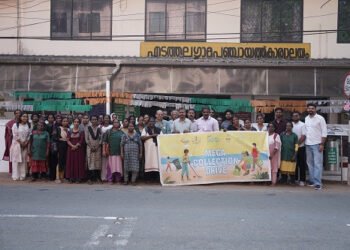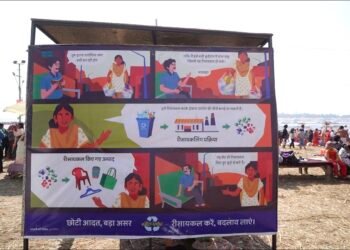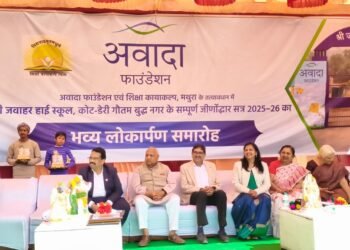New Delhi (India CSR): Akhil Bhartiya Gramin Uthan Samiti (ABGUS) takes a step toward creating awareness for Sanitary & Menstrual Hygiene in rural areas. In partnership with Markem Imaje Private Limited, ABGUS has built a toilet complex for Unisex & Differently-abled along with a pink room to provide clean and modern toilet facilities to pupils & teachers of the Kamalpur government senior secondary school of Tijara, a block in the district of Alwar, Rajasthan. ABGUS is an NGO working towards empowerment and development of the underprivileged through its various programs in the environment, health, education, and livelihood sector.
Deepak Khandelwal, Finance Director of Markem Imaje Private Limited graced the occasion as chief guest and inaugurated the toilet complex and Pink Room along with Rajesh Verma, Executive Director of Akhil Bhartiya Gramin Uthan Samiti (ABGUS). The team of Markem Imaje and ABGUS were present in the program.
Also Read: A student-led NGO and Jaipur Foot organise limb donation drive
Commenting on the development, Rajesh Verma, Executive Director of Akhil Bhartiya Gramin Uthan Samiti (ABGUS) said, “The purpose of building gender-friendly toilets and the pink room was to reduce the problems personal hygiene and sanitation especially faced by girls and female teachers during menstruation. When we organized an awareness campaign in the villages of Tijara, we learned that girls studying in the village miss their school for a week because of the unavailability of proper sanitary tools. This was also one of the major factors that led us to build the pink room to ensure the continuity of education among girls remains unharmed. This initiative will benefit 189 numbers of students and 9 teachers as well as create awareness among the people of the rural area. We plan to build a few more Pink rooms and Toilet complexes in the area so that common people can also benefit from it.”
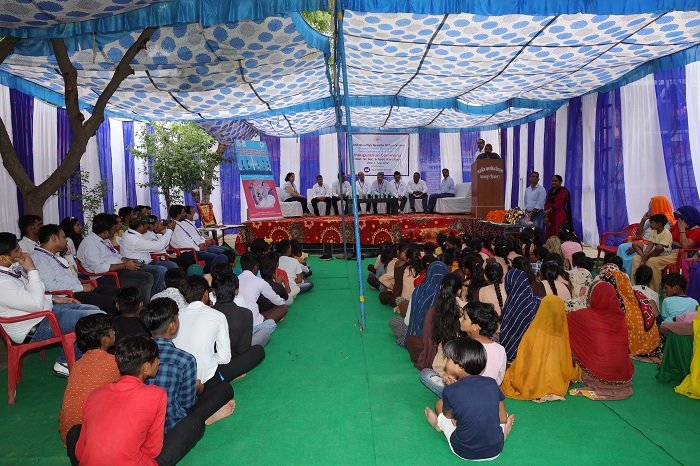
Other than the construction of the toilet complex, most noteworthy was the construction of Tijara’s very first Pink Room. The Pink Room has Vending machines and incinerators installed inside. Girls can take sanitary pads/napkins from the vending machine and dispose of the soiled napkin with the incinerators. Further to ensure proper sanitation and functioning, a ’Kishori Group‘ was appointed within the school premises, who were taught how to operate the pink room faculty as well as how to educate youngsters about menstrual health and its management.
On the occasion, Deepak Khandelwal, Finance Director of Markem Imaje Private Limited said, “It is a privilege to dedicate this toilet complex and pink room to the Kamalpur school with the help of ABGUS NGO. Hygiene and Sanitation should be everyone’s first priority and to make the facilities available to everyone it is important to take proactive measures. The Pink room and toilet complex are the first of its kind in Tijara block towards it.”
Also Read: CSR: Karnataka launches a state-wide eye care awareness campaign in association with CGI and NGOs
The rural parts of India, Sanitary hygiene still remain a problem. Though the situation has improved a lot after Swachh Bharat Abhiyan, many people, especially in the village, still think urinating and defecating in open areas is normal. It becomes even more troublesome when it comes to menstrual hygiene. Menstruation is still perceived as a taboo and people simply avoid talking about it, let alone take measures to ensure maintaining menstrual hygiene. Improper menstrual hygiene management can harm our environment and health as well as cause disruption in education. A single Sanitary Pad/Napkin could take 500 to 800 years due to the plastics used in their production. And even after decomposing, these plastics just break down into microplastics which continue to contaminate the soil. Building a pink room in every area could bring solutions to saving the environment and health.
(India CSR)

